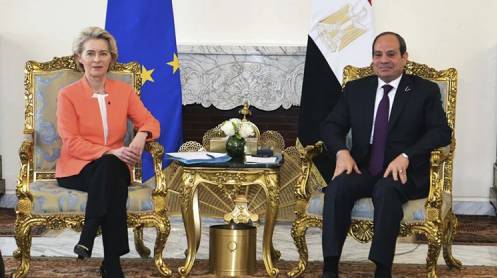A high-level delegation from the European Union (EU), led by European Commission President Ursula von der Leyen and joined by leaders from Austria, Belgium, Cyprus, Greece, and Italy, visited Egypt to announce a significant financial package totaling 7.4 billion euros. The deal, aimed at enhancing energy trade and addressing irregular migration flows to the EU, includes various components such as credit for Egypt and increased energy sales to reduce reliance on Russian gas.
The Strategic and Comprehensive Partnership agreement encompasses five billion euros in loans over four years, 1.8 billion euros in investment, and additional funding for bilateral projects related to migration and other areas. Egypt, facing economic challenges and situated in a volatile region bordered by Libya, Sudan, and the Gaza Strip, holds strategic importance for Europe.
The agreement underscores efforts to cooperate on security, counter-terrorism, and border protection, particularly along Egypt’s southern border with Sudan. While the Gaza Strip situation was part of the discussion, the main focus remained on broader regional stability and migration issues.
The delegation’s visit signifies the EU’s commitment to engaging with Egypt amid ongoing conflicts and migration challenges in the region. The deal follows similar agreements with other North African countries and reflects the EU’s strategy to manage migration flows across the Mediterranean.
Despite criticisms from human rights groups regarding cooperation with authoritarian regimes, the EU emphasizes the need for pragmatic measures to address migration while supporting Egypt’s economic recovery. Egypt’s economy, impacted by various factors including the COVID-19 pandemic, food price increases, and disruptions to shipping in the Red Sea, requires substantial financial support to manage its external debt and sustain economic stability.







